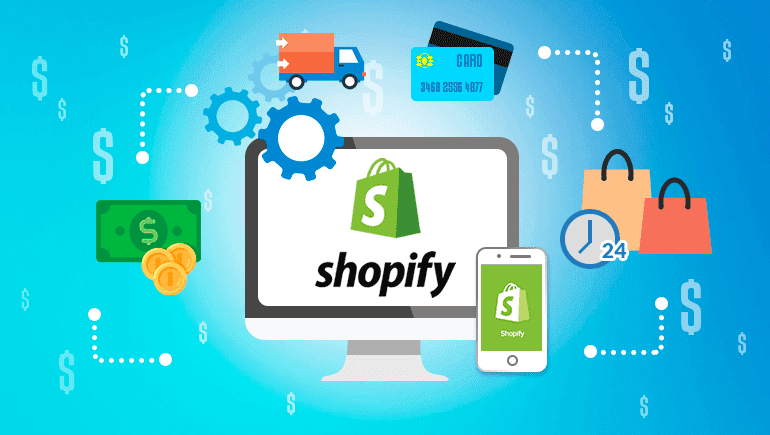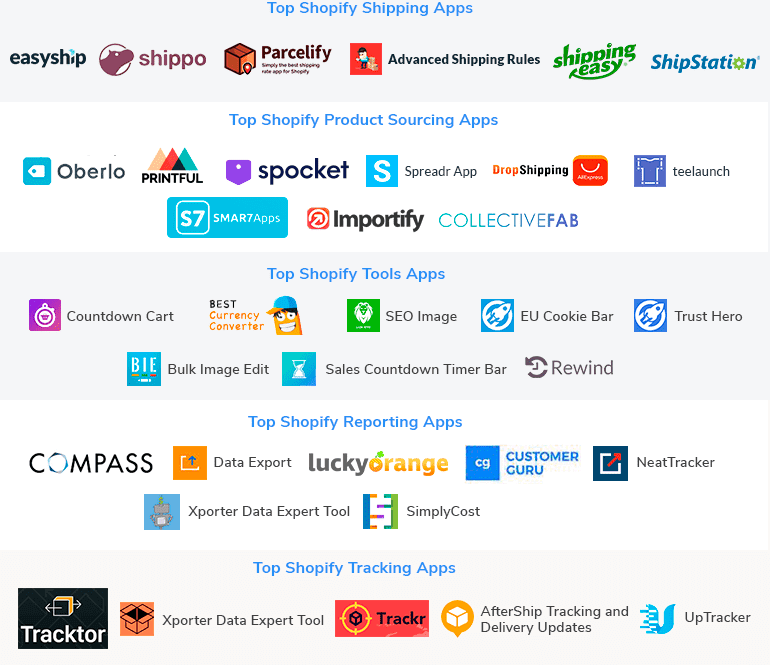Shopify Apps – Your Way to Ecommerce Success
READ WHOLE ARTICLE

Shopify is one of the most robust eCommerce platforms around. That is why it powers over 500,000 ecommerce businesses across the world.
Shopify’s immense popularity is a product of the platform’s ease of use and continuous innovation. Much of its innovation is a product of its thriving add-on ecosystem, which now boasts of 1200+ apps. These apps give ecommerce businesses enhanced capabilities and new features that allow them to make their online shopping platforms more efficient, feature-rich, and useful for their customers as well as themselves in the back end. The benefits offered by Shopify apps are tremendous. Therefore, it is important for all online businesses to take a closer look at them and understand how they can leverage these apps to drive their business growth.
What is a Shopify App?
A Shopify app is, at its core, a plugin, an extension that gives a business additional capabilities than what is available on their core Shopify eCommerce platform.
Shopify apps work pretty much the same way as WordPress plugins or browser extensions. You have a basic Shopify eCommerce platform that comes with some basic functionalities. The various Shopify integrations allow you to add new features and functionalities to your Shopify platform. A bulk of the Shopify apps are available for download and installation for everyone on the Shopify App Store. Some of them are free, while some of them come with easily affordable price tags.
Apart from these apps, businesses can also get third-party Shopify developers to create custom Shopify apps for their unique requirement.
The short answer – every store built on the Shopify platform.
The long answer is that growing businesses that are using the Shopify platform require a wealth of advanced capabilities that their basic Shopify package cannot offer. They must use Shopify apps to increase sales, add new features, track their customer behavior, engage them more meaningfully, resolve their bottlenecks, generate insightful reports, offer customer support, improve the security of user data, and so on.
In effect, every Shopify business that is striving to achieve more from their business and grow will need the right set of Shopify apps that are relevant to their unique needs. Some of these apps are designed to provide value to the customers, some offer value to the businesses on the back end, and some others offer benefits to both.
Why does an E-Business owner need Shopify apps?
The eCommerce shoppers abandon roughly 69 percent of the cart additions. What if business owners could track why the shoppers are abandoning their carts and address their issues? There would be more purchases, right? Well, there is no point in pondering over it, because that’s exactly what a number of apps do. They track the behavior of the customer on the platform and at what point they abandoned their carts. Business owners can revisit those points and examine the bottlenecks and resolve them. This is just a simple example of how Shopify apps can help business owners improve their processes.
Likewise, there are tons of other benefits that e-business owners can receive from Shopify apps, including extensive analytics, report generation, bulk product uploading and editing, in-stock alerts, generating custom invoices, and so on.
How can Shopify apps help customers?
Modern consumers are accustomed to the fluid smooth, feature-rich, and extremely user-friendly web platforms. Whichever website they use, they compare their user-oriented design with the likes of Amazon, Facebook, Twitter, Gmail, and other popular platforms. The features offered on those platforms have become benchmarks in their industry.
In the cases of ecommerce businesses, shoppers demand the same level of user-focused features. One of these features is the ‘reviews’. Users want to share their product and seller experience on the product’s page to help other shoppers. Also, they want to read other shoppers’ reviews before making the purchase. Studies claim that as much as 73 percent of the shoppers read reviews before making an online purchase. There are Shopify apps that enable e-store owners to allow their customers to share reviews on the website.
Similarly, there are special purpose Shopify apps that add customer-facing functionalities like carts, recommendations, customer support systems, live chats, contact forms, surveys, order editing, product return/replacement requests, and so on.
What are the advantages of using Shopify apps?
There are a plethora of advantages of using Shopify apps for an ecommerce business. Multi-Programming Solutions as an application development company creates Shopify integrations that allow businesses to enhance their capabilities and achieve more from their ecommerce platforms. Here’s how:
1. They simplify, streamline, and save time
As an ecommerce business, you probably have to upload hundreds of products’ information on the website. You also need to transfer a wealth of data from the website to your ERP system or analytics tool. Not to mention the fact that your customers must be able to shop on your website, select the payment method, choose the shipping method, enter their details, and make the payments seamlessly. Shopify apps simplify the entire process.
Business can upload product information in bulk, make changes with ease, and enable faster and smoother shopping experience for their customers by using the right Shopify apps. These apps can even help them extract and automate data transfer to supported platforms, saving the users a ton of time in performing low-level tasks.
All of these apps have been optimized to make their functions as easy as possible. Even business owners who are not particularly tech-savvy can easily use them and even customize them to their requirements.
2. Service reliability and security
Customer ecommerce platforms come with a bevy of bugs, issues, and limitations. A bulk of the Shopify apps have been time-tested by hundreds of thousands of businesses over time. They have a long legacy to support their reliability and credibility. Also, most Shopify app developers release updates to their apps that fix any issues or vulnerabilities in them. In effect, these apps are offered as SaaS packages. Thus, the e-business owners never have to worry about the technical aspects involved in designing or operating their ecommerce platform. They get a clean, highly secure, and efficient platform and ecosystem of apps that meet their every need.
3. Affordability
Shopify websites are extremely cost-effective, especially for small and medium businesses. The platform comes with multi-tiered plans and businesses can choose a plan to suit their needs. Also, many of the commonly used features are freely available as add-ons. Even the premium apps usually cost less than $100 a month, with many of them well below the $50 per month mark. For a small or medium business that is looking at a highly reliable platform to take off, this is the best deal they can get in the market.
Shopify’s App Store offers all kinds of apps from marketing apps to logistics apps to product apps to analytics. It has everything that a thriving business needs and at affordable prices.
4. Superior customer service
This is perhaps the most important advantage offered by Shopify Apps. At the end of the day, shoppers purchase where they get the best experience. “Best” can mean different things for different customers. For some, it can mean good vouchers, for others it can be a reliable reviews system, an efficient shipped product tracking system, responsive live chat support, excellent product recommendations, a stunning email, or something else. Shopify apps allow businesses to deliver them all and more. A happier and more satisfied customer is more likely to purchase again. This is vital, considering that customer acquisition costs up to 7 times higher than customer retention.
5. Obtain actionable intelligence
Shopify apps help businesses obtain deep insights about their customers, their own operations, their website’s performance, the performance of their email campaigns, and a dizzying variety of other information about everything from their products to marketing strategies. These insights can be used to improve their business strategies and tactics to galvanize their growth.
There are three critical factors you must consider when choosing a Shopify app for your business – reputation, usability, and support.
The Shopify App Store allows you to sort all apps on the platform by their reviews. Choose the apps that have a large number of reviews. High ratings given by a small number of people do not reflect the app’s actual usability. Pick apps that have large volumes of reviews, even if the overall rating is slightly lower. The next step is to check their usability. Many apps give users live demos to help them use and understand the functionalities of the app. Lastly, customer support is extremely important. Although rare, Shopify apps do have bugs and issues. Sometimes, you may just have a problem using a particular functionality. Therefore, support is essential. Choose apps whose developers offer a responsive support system.
Most popular Shopify apps and categories
Depending upon what type of business and industry you are operating in, your business might require multiple sets of Shopify apps to operate effectively and efficiently. Here are the top categories of Shopify apps as well as the most popular integrations under all categories:

Limitations of app store Shopify apps
While it is true that App Store features an extensive variety of apps that offer a great many features for the businesses, they are not without their limitations. The typical problem associated with them is that they are designed with a one-size-fits-all approach. They feature functionalities that are used by a maximum number of businesses and cannot meet the unique and specific needs of every business. That is why a growing number of Shopify e-businesses hire professional app developers to create custom Shopify apps that are tailored for their operations and requirements.
Conclusion
Shopify is a highly versatile ecommerce platform with one of the most thriving ecosystems of third-party apps. Using the right apps can help businesses unlock enormous potential and achieve sustainable business growth. However, not all App Store Shopify apps are designed to meet every type of business’s needs. That’s why, some of the leading Shopify stores trust Multi-Programming Solutions to create highly reliable, feature-rich, and advanced custom Shopify Apps that are tailored to meet their unique business requirements. As a leading player in this industry, we have created custom Shopify apps for our business users that boast of advanced capabilities, deliver fluid-smooth performance, and are super-easy to use.
Discover more about how we can build Shopify apps that firepower your business’s growth? Do you want to know a shopify app development cost? Reach out to us here.
Multi-Programming Solutions is a professional high-experienced company which provides complex custom solutions for business development including casino games, Shopify applications, cross-platform mobile applications development and Unity WebGL conversion. Our specialists have vast technological expertise in the use of such technologies like PHP Frameworks (Laravel, Yii, Zend, Symfony), CMS (Magento, Shopify), Facebook API, Google API, Google Maps AP etc.

36 Kings Road
CM1 4HP Chelmsford
England


